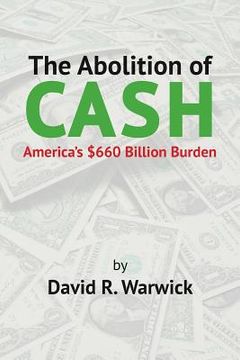Reseña del libro "The Abolition of Cash: America's $660 Billion Burden (en Inglés)"
"America needs to advance the timetable for the cashless society with a plan of action because cash is an economic drain that won't disappear naturally in the US for at least several more decades," says its author, David R. Warwick In The Abolition of Cash: America's $660 Billion Burden, he states that despite cashless trends in Scandinavia and elsewhere American progress toward cashlessness is at a standstill because of public angst over identity theft and sensitivity about data privacy. Warwick contends that abolition of cash shouldn't be feared; but welcomed. He demonstrates statistically that physical cash is far more costly. He points out that even cybercrooks rely on cash -for example, in bogus withdrawals from ATMs. In the bigger picture, he says cybercrime and ID theft are relatively minor and manageable. He compiles costs of cash in serious crimes, tax dodging, and inefficiency with administrative outlays to show that "...the overall cost of cash is four to five times the total cost of cybercrime." He arrives at a cash cost of $660 billion (before he stops counting) which, he points out, is roughly equal to outlays for old-age Social Security, and saddles the average American household by over $6,000 per year. Warwick addresses a range of questions about a cashless society including "What happens when the power fails." He anticipates how tax evaders, drug dealers and narcotraffickers would react to an absence of cash; and analyzes post-cash roles of gold, foreign currencies, and virtual currencies as possible substitutes for cash in crime. His book describes the unattended 24/7 ATM as a sort of microcosm of cash crime - a place where 7,500 Americans are robbed each year; where crooks use "skimmers" to siphon off patrons' bankcard and PINs; where "carders" use phony bankcards made from hacked card numbers to steal money; and where fifty times a day 'crash and grab' thieves ram stolen vehicles into buildings and cart away entire ATMs. Warwick evaluates the legitimate uses of cash privacy through real-life examples, and weighs their loss against the overall cost savings of abolishing cash, as well as against freedoms from being attacked in robberies, a more civil society, and benefits to the poor. His position of payment privacy and even anonymity in digital payment media is that they must be protected -- provided that a means of data access is provided for law enforcement and legally-entitled third parties. This would rule out fully anonymous payment media, of course. Yet, he says that even if postcash payments were fully anonymous, society would nevertheless gain major benefits from cashlessness, including the end of violent cash robberies, thefts and burglaries of cash, as well as savings from efficiency. Warwick rates Bitcoin and copycat currencies as clunky and ill-suited for mainstream payments. More menacingly, he sees their use in crime as a continuing obstacle for law enforcement. He anticipates that cybercrime will never be wiped out but says "this doesn't justify keeping cash in circulation any more than automobile crashes are a reason to keep horses around for transportation." This is an entertaining and thought-provoking book. It's well researched and makes a timely read in an increasingly cashless world.

